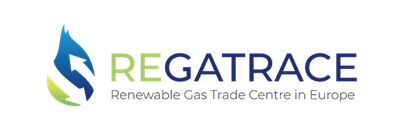
Links
Key partners
Renewable Gas Research Centre
www.r2gas.org
Research Centre for Renewable Gases (R2Gas) was founded in July 2019 as a non-profit association based in Vienna (Austria). It focuses on cutting-edge research activity, which converts into a range of services, providing private and governmental sector with studies, technologies, and consultancy.
The organization contributes to substitute fossil gases by sustainable renewable gases for all applications (mobility, electricity and heat production) and improves efficiency of energy transportation and storage including P2G. The association evaluates the best available technologies, contributes to technology development and supplies reliable and sound information for decision makers, policy and industry. R2Gas embraces experienced, top experts from research, development, business, and academia from all across Europe.
R2Gas members together dispose over an extended network of different stakeholders from all over Europe in the area of sustainable gases and its application that they can rely on to provide solutions by removing both the technical and the non-technical barriers. Thanks to the association’s members from engineering, chemistry, natural sciences and business together with the wide network, R2Gas can significantly contribute to perform tasks set at a high professional level.
Important links
MEKH
www.mkeh.hu
The Hungarian Energy and Public Utility Regulatory Authority (HEA) is the regulatory body of the energy and public utility market, supervising the national economy’s sectors of strategic importance.
HEA, as an independent regulatory authority entrusted with provision making powers was established under Act XXII of 2013 as the successor of the Hungarian Energy Office (HEO) that was set up under Act XLI of 1994 on Gas Supply.
BIOGEST
www.biogest.at
BIOGEST® is an international biomethane and biogas plant manufacturer headquartered in Austria with subsidiaries in France, Italy, Romania, Serbia, Czech Republic, UK and US. With a team of more than 50 highly qualified employees, we have already completed over 160 biogas plant projects, generating electricity or biomethane worldwide. Our end-to-end supply chain aims at ensuring efficient plant operation.
European Biogas Association
www.europeanbiogas.eu
EBA is the voice of renewable gas in Europe. Founded in February 2009, the association is committed to the active promotion of the deployment of sustainable biogas and biomethane production and use throughout the continent. EBA counts today on a well-established network of over 100 national organisations, scientific institutes and companies from Europe and beyond..
REGATRACE project
www.regatrace.eu
REGATRACE (Renewable GAs TRAde Centre in Europe) aims to create an efficient trade system based on issuing and trading biomethane/renewable gases Guarantees of Origin (GoO). This will strongly contribute to the uptake of the European common biomethane market. It will be achieved by setting up a European biomethane/renewable gases GoO system, by setting up national GoO issuing bodies, by integrating GoO from different renewable gas technologies with electric and hydrogen GoO systems, through integrated assessment and sustainable feedstock mobilisation strategies and technology synergies, through support for biomethane market uptake, and by transferring the results beyond the project’s countries.
A stable, reliable and common market for biomethane and other renewable gases in Europe can help achieve EU political targets and decouple its energy systems from fossil fuels: biomethane/renewable gases can be produced from waste or residual streams of organic material, and they can be transmitted and stored in existing infrastructures, making it possible to combine the European natural gas and electricity grids.
ERGaR
www.ergar.org
The main purpose and structure of the European Renewable Gas Registry (ERGaR) is independence, transparency and trustworthiness, and the members of the organisation come from all over Europe. ERGaR provides a central contact in Brussels through a general secretariat.
ERGaR is establishing an independent, transparent and trustworthy documentation scheme for mass balancing of biomethane (biogas upgraded to natural gas quality), and other renewable gases distributed along the European gas network. Thanks to the experience of national registries, the documentation system will enable cross-border transfer of certificates for renewable gases via the European natural gas network while preventing double sale and double counting, made possible via providing a technical hub and documentation for cross-border transfer of sustainable certification (Certificates of Origin).
University of Szeged
www.biotech.brc.hu
The University of Szeged is one of the largest universities in Hungary with more than 35 thousand students and 8 thousand employees. The Department of Biotechnology belongs in the Faculty of Sciences and Informatics.
In addition to the teaching duties, basic and applied research has been carried out in the fields of molecular bioenergetics, metalloenzymes, anaerobic microbiology, metagenomics and metatranscriptomics of complex microbial communities, biological hydrogen production and anaerobic degradation of biomass, biogas generation. The team directly involved in the planned project comprises one Professor Emeritus, 1 Associate Professor and several Postdocs, PhD, graduate and undergraduate students. The team has more than 35 years of experience in anaerobic microbiology and molecular biology.
The infrastructure includes major analytical instruments, e.g., GC, GC-MS, HPLC, FPLC, spectrophotometers, spectrofluorimeter, total nitrogen and carbon, organic nitrogen and carbon measurement devices, lignocellulose fibre analysis, incubators, anaerobic chambers, PCR, qPCR, etc. We also have access to the up-to-date DNA and RNA sequencing and proteomic facilities in the neighbouring Biological Research Center. The laboratory has a capacity to run about 150 parallel batch anaerobic fermentations and we have designed and built 24 continuously stirred tank (CSTR) type semi-automatic laboratory anaerobic reactors.
Energiaklub
www.energiaklub.hu
ENERGIAKLUB has remained true to its unique mission, having spent close to 30 years in creating a new awareness in Hungary. With its research, training courses, and wide-reaching communication the organisation’s aim is to make energy producers, users and perhaps even political decision-makers regard energy in a different way. A rational use of the dwindling resources, an economy based on diverse local resources, a change in energy-wasting consumer habits; these are all part of the solutions which Energiaklub supports through its work.
Magyar Biogáz Egyesület
www.biogas.hu
Non-governmental organisation representing the interests of the Hungarian biogas industry, established in 2004. Member of the European Biogas Association
BIOSURF project
www.biosurf.eu
BIOSURF was an EU-funded project performed between 2014-2017 under the Horizon 2020 programme for research, technological development and demonstration.
The objective of BIOSURF (BIOmethane as SUstainable and Renewable Fuel) is to increase the production and use of biomethane (from animal waste, other waste materials and sustainable biomass), for grid injection and as transport fuel, by removing non-technical barriers and by paving the way towards a European biomethane market.
The BIOSURF consortium consists of 11 partners from 7 countries (Austria, Belgium, France, Germany, Hungary, Italy and United Kingdom), from Hungary the Hungarian Biogas Association participated in the project.










